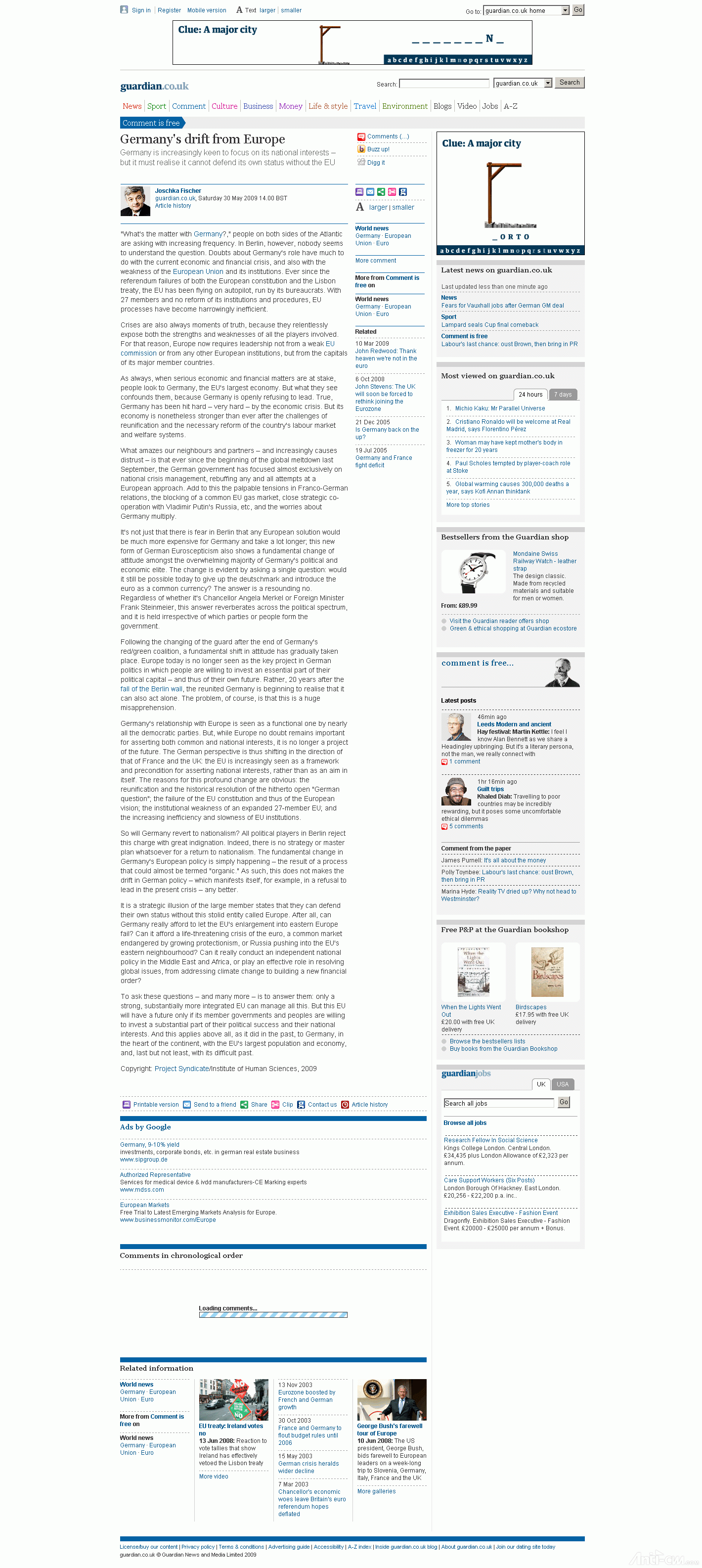|
|
本帖最后由 I'm_zhcn 于 2009-6-1 00:09 编辑
Germany's drift from Europe
http://www.guardian.co.uk/commentisfree/2009/may/30/germany-europe-eu
Joschka Fischer Saturday 30 May 2009 14.00 BST
Germany is increasingly keen to focus on its national interests – but it must realise it cannot defend its own status without the EU
"What's the matter with Germany?," people on both sides of the Atlantic are asking with increasing frequency. In Berlin, however, nobody seems to understand the question.
Doubts about Germany's role have much to do with the current economic and financial crisis, and also with the weakness of the European Union and its institutions. Ever since the referendum failures of both the European constitution and the Lisbon treaty, the EU has been flying on autopilot, run by its bureaucrats. With 27 members and no reform of its institutions and procedures, EU processes have become harrowingly inefficient.
Crises are also always moments of truth, because they relentlessly expose both the strengths and weaknesses of all the players involved. For that reason, Europe now requires leadership not from a weak EU commission or from any other European institutions, but from the capitals of its major member countries.
As always, when serious economic and financial matters are at stake, people look to Germany, the EU's largest economy. But what they see confounds them, because Germany is openly refusing to lead. True, Germany has been hit hard – very hard – by the economic crisis. But its economy is nonetheless stronger than ever after the challenges of reunification and the necessary reform of the country's labour market and welfare systems.
What amazes our neighbours and partners – and increasingly causes distrust – is that ever since the beginning of the global meltdown last September, the German government has focused almost exclusively on national crisis management, rebuffing any and all attempts at a European approach. Add to this the palpable tensions in Franco-German relations, the blocking of a common EU gas market, close strategic co-operation with Vladimir Putin's Russia, etc, and the worries about Germany multiply.
It's not just that there is fear in Berlin that any European solution would be much more expensive for Germany and take a lot longer; this new form of German
Euroscepticism also shows a fundamental change of attitude amongst the overwhelming majority of Germany's political and economic elite. The change is evident by asking a single question: would it still be possible today to give up the deutschmark and introduce the euro as a common currency? The answer is a resounding no. Regardless of whether it's Chancellor Angela Merkel or Foreign Minister Frank Steinmeier, this answer reverberates across the political spectrum, and it is held irrespective of which parties or people form the government.
Following the changing of the guard after the end of Germany's red/green coalition, a fundamental shift in attitude has gradually taken place. Europe today is no longer seen as the key project in German politics in which people are willing to invest an essential part of their political capital – and thus of their own future. Rather, 20 years after the fall of the Berlin wall, the reunited Germany is beginning to realise that it can also act alone. The problem, of course, is that this is a huge misapprehension.
Germany's relationship with Europe is seen as a functional one by nearly all the democratic parties. But, while Europe no doubt remains important for asserting both common and national interests, it is no longer a project of the future. The German perspective is thus shifting in the direction of that of France and the UK: the EU is increasingly seen as a framework and precondition for asserting national interests, rather than as an aim in itself. The reasons for this profound change are obvious: the reunification and the historical resolution of the hitherto open "German question"; the failure of the EU constitution and thus of the European vision; the institutional weakness of an expanded 27-member EU; and the increasing inefficiency and slowness of EU institutions.
So will Germany revert to nationalism? All political players in Berlin reject this charge with great indignation. Indeed, there is no strategy or master plan whatsoever for a return to nationalism. The fundamental change in Germany's European policy is simply happening – the result of a process that could almost be termed "organic." As such, this does not makes the drift in German policy – which manifests itself, for example, in a refusal to lead in the present crisis – any better.
It is a strategic illusion of the large member states that they can defend their own status without this stolid entity called Europe. After all, can Germany really afford to let the EU's enlargement into eastern Europe fail? Can it afford a life-threatening crisis of the euro, a common market endangered by growing protectionism, or Russia pushing into the EU's eastern neighbourhood? Can it really conduct an independent national policy in the Middle East and Africa, or play an effective role in resolving global issues, from addressing climate change to building a new financial order?
To ask these questions – and many more – is to answer them: only a strong, substantially more integrated EU can manage all this. But this EU will have a future only if its member governments and peoples are willing to invest a substantial part of their political success and their national interests. And this applies above all, as it did in the past, to Germany, in the heart of the continent, with the EU's largest population and economy, and, last but not least, with its difficult past.

|
drift, Europe, Germany, 卫报, drift, Europe, Germany, 卫报, drift, Europe, Germany, 卫报
|